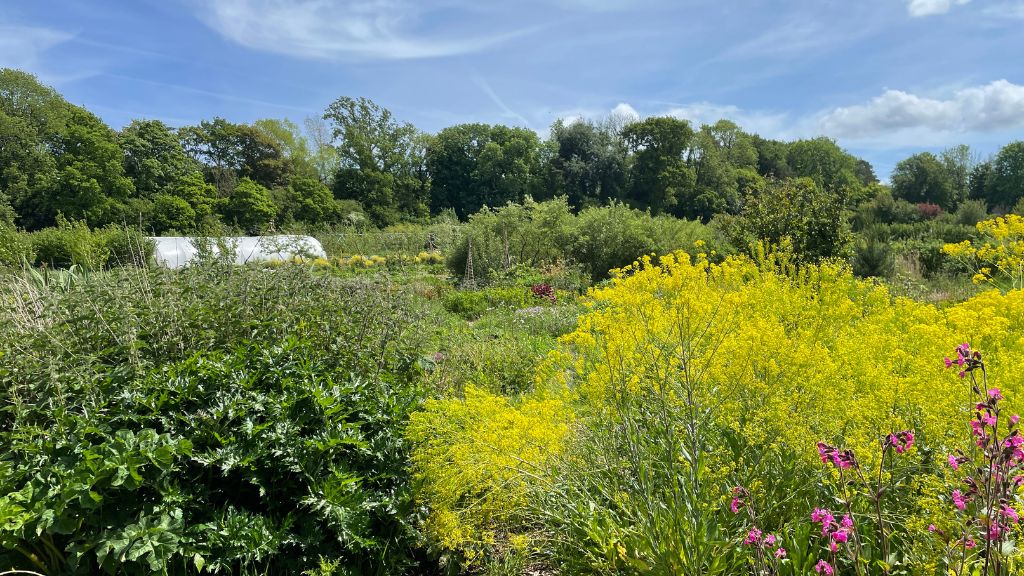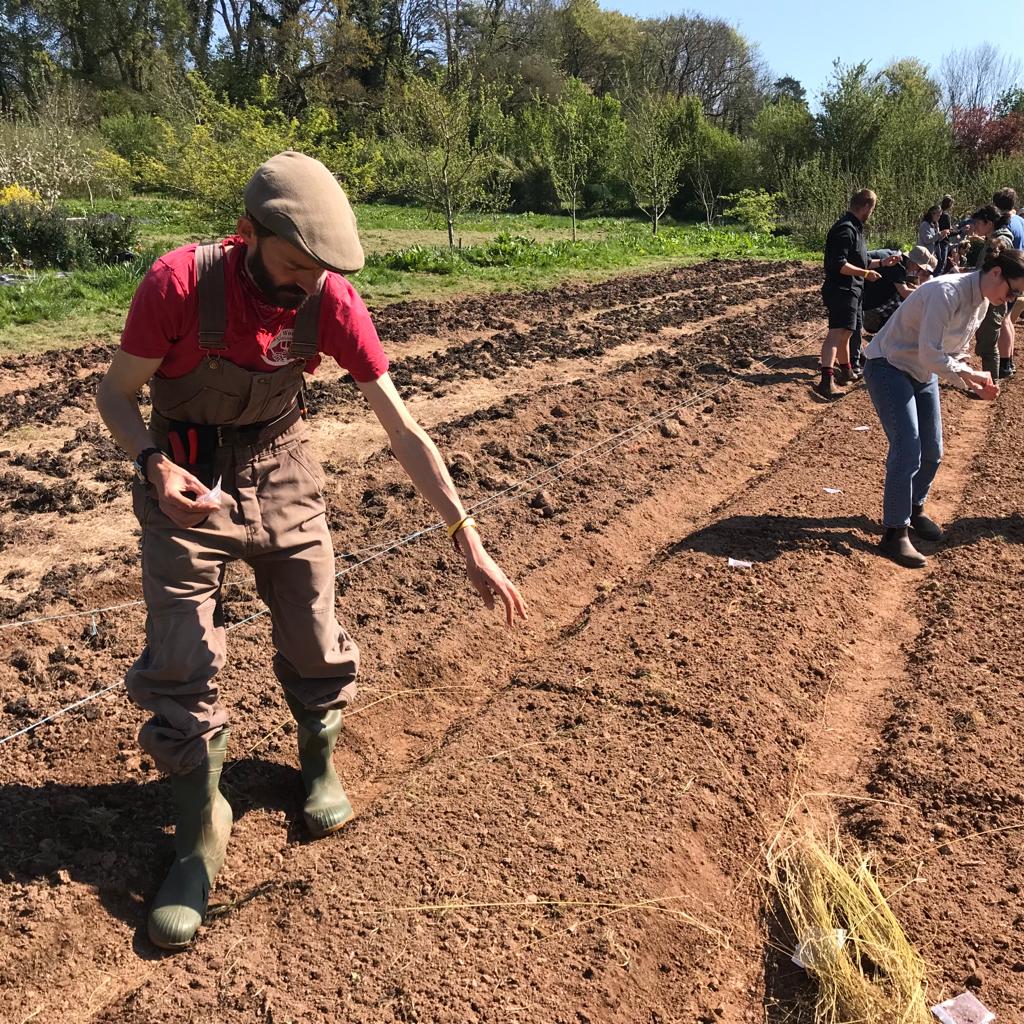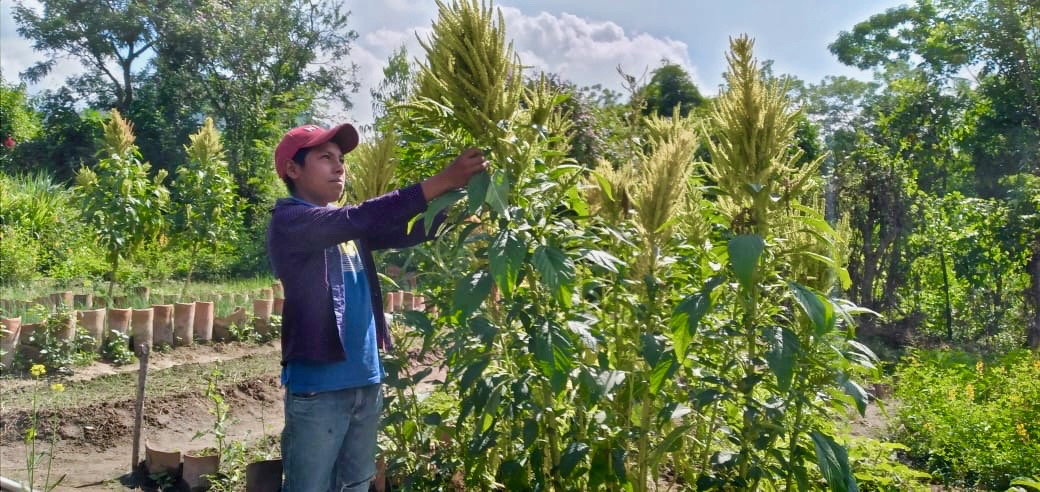Transforming the food system is no longer optional
In this energising blog piece our MSc Regnerative Food, Farming and Enterprise lecturer, Dr Nathan Einbinder, blogs about the current food price rises, their causes and the systemic issues they expose, and argues that this moment of crisis can and must be a catalyst for real change across the sector.

Henri’s Field, an experimental agroforestry growing space on the Dartington estate run by Schumacher College.
We’ve all read about it in the news and felt it in our pocketbooks. The price of food – along with nearly all our living expenses – are on the rise, and fast. According to The Guardian, the cost of basic staples has risen by nearly ten percent in one month. The culprit? Volatile oil and gas prices, which affect nearly everything (fertilizer included), along with disruptions in supply chains due to climate change and the war in the Ukraine.
Of course, there are other factors at play. Diving deeper into the issue, we find an array of complex issues – many of them having little to do with supply and demand, rather corporate greed and speculation, and uniformity across the entire chain. But no matter how we understand or approach the unfolding crisis, there should be just one conclusion: that the global food system is broken. And the only solution is transforming it altogether.
It’s a bold proposition, though hardly new. For decades experts, activists, and some politicians have been sounding the alarm and calling for radical changes to the industrial food system. As scholar Raj Patel argues, even when “functioning” the global food system leaves nearly a billion hungry or suffering from malnutrition, and another two billion overweight or obese.

Image: Head Gardener, Colum Pawson, leads a flax seed sowing session in Henri’s Field with students on our hoticulture programme.
Yet still, for most people, the idea of transforming something so colossal – not to mention something so necessary, for feeding the world – is daunting. We’ve been led to believe that what’s happening is inevitable. That the only way to avoid a food crisis is to keep oil cheap and abundant; along with boosting productivity through high technology, and maintaining secure links to distant harvests (despite mounting evidence that these foods aren’t even destined for human consumption). We’re unable to imagine the possibilities of something different because we see this as the only way.
Those of us involved in the alternative food and farming movement know this is untrue. We’ve seen with our own eyes how abundant and nutritious food can be grown independently from fossil fuels and destructive global markets, and witnessed the diversity and life brought back to soil all but destroyed by industrial agriculture. We’ve seen the potential of bold, out-of-the-box thinking – and action – to help recreate and regenerate broken food economies and cultures.
These are the ingredients that will make up a transformed food system. Often hidden, they exist everywhere. In every city and community across the globe there are examples of individuals and organizations taking back control of their food production and consumption, and stewarding the land in a way that is more harmonious with nature. Some have been doing this for generations, others are just beginning. As uncertainty becomes the norm, and standardized food becomes more and more unhealthy and unreliable, interest in alternatives and engaging with food and agriculture grows.
Crises are devastating and prejudiced against those who can least withstand them. Yet they also serve as catalysts for innovation and uncommon solidarity, and radical change. We’ve seen this in the agroecology movement in the global south, and the Victory Garden mobilizations during WWII.
In times of crisis, attitudes shift. Those resistant to change may suddenly become open to it, out of necessity. We see this now among farmers whom for decades have relied on cheap, artificial nitrates to feed their crops and grass. With costs steadily rising and subsidies phasing out, there is a need for something different. And the search for alternatives is on.
How these newly interested farmers are engaged, inspired, and supported remains a key question. Connecting them with regenerative practitioners who have eliminated their dependency on agrochemicals by adding life to the soil and biodiversity will be essential. They will need to see these practices and results firsthand and be empowered by those who have taken the plunge. They will also require long term accompaniment and networks to help ease the transition and spark new innovations.
I want to believe that by restoring soil and working with nature, rather than against it, farmers might ignite all sorts of positive outcomes, like healthier food, for example, plus more birds and beneficial insects, and more carbon stored. Yet we mustn’t think that changing farming practices alone is all we’ll need to transform the system, nor that a trickle up affect will happen in all cases. It’s going to take many actions at many levels to overturn the industrial model, including tackling some thorny issues around inequality, access, and corporate power over markets and diets that are increasingly simplified.

The problems are monstrous – but mustn’t provoke a sense of despair, rather opportunity, even excitement. As our society comes closer and closer into agreement that transformation is necessary, we can move into it together. We can support each other, while building new narratives and appreciation for food and food producers. This will require a great collective effort, with many more regenerative farms and projects in many more places. This is how scaling should look, rather than the present model which encourages larger and larger farms with fewer people on the land.
Our programmes in regenerative food and farming and horticulture take this holistic approach in tackling the current crisis. On one hand we seek to understand and analyse it; on the other we dream and develop practical, ingenious solutions. We learn from each other, co-creating knowledge, as well as from those already committed – farmers and trailblazers like Marina O’Connell at the nearby Apricot Centre, whose strategies for building community resilience has attained national recognition; to Simon Platten at Tamar Grow Local, whose pioneering work in developing local markets has created the medium for community revitalization; and the crew at School Farm CSA, dedicated to providing just access for the finest agroecologically-grown food. These are our teachers and masters, among so many others.
To transform food and farming we’ll need many more examples – and stories, about the possibilities of a regenerative system that honors heritage and tradition, as well as fresh ideas and leadership. The time is now for demonstrating that another world is possible.
Written by Dr Nathan Einbinder
We are accepting applications for our range of Regenerative Farming and Sustainable Horticulture programmes, with bursaries available to early applicants. Click the links below to explore the courses we are offering at Schumacher College.
